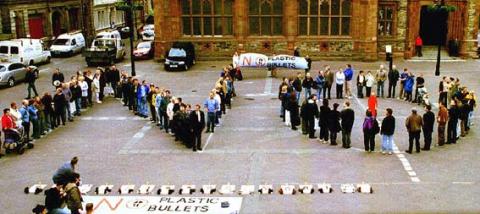Plastic Bullets / Tasers / CS Gas
17 people were killed during the conflict by members of the security forces firing plastic or rubber bullets/ batons. 8 of the 17 people were children, and all but one was catholic.

Three civilians were killed as a result of the use of rubber bullets before they were replaced by plastic bullets in 1973, Francis Rowntree (11 years old), Thomas Friel (18 years old), and Tobias Molloy (21 years old). PFC has uncovered declassified British government documents from the National Archives on the dangers posed by rubber bullets, including concerns that technical data highlighting the lethal nature of rubber bullets might be exposed in the legal case for compensation being taken on behalf of Derry schoolboy Richard Moore who was blinded by a rubber bullet. This information helped persuade the Attorney General to grant a new inquest to examine the circumstances of Thomas Friel’s death.
PFC has also uncovered a number of declassified documents that paint an alarming picture concerning the dangers of plastic batons. These include correspondence between the Chemical Defence Establishment (CDE)at Porton Down and officials within the Ministry of Defence (MOD). It was the responsibility of the CDE Establishment to test plastic bullets, and inform an Independent Medical Committee of their findings who would then report to government Ministers. The CDE repeatedly complained that they were being “thwarted” from fulfilling their responsibilities as the MOD was not providing information on the nature or types of injuries as a result of the use of plastic bullets here in the north.
Declassified documents also highlight faults with the trigger mechanism, a misaligned site, and a weak breech locking mechanism that could cause the weapon to open when firing.